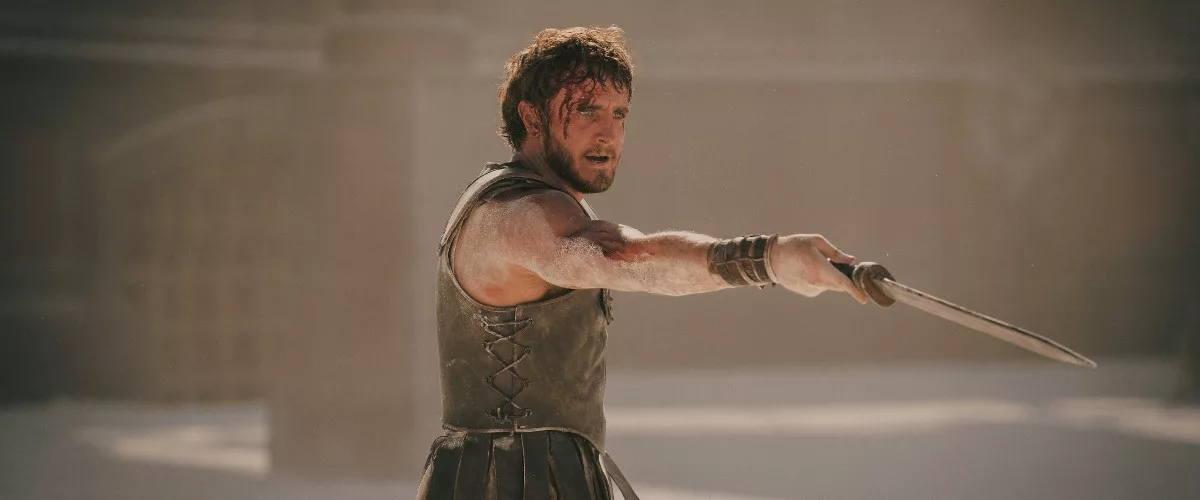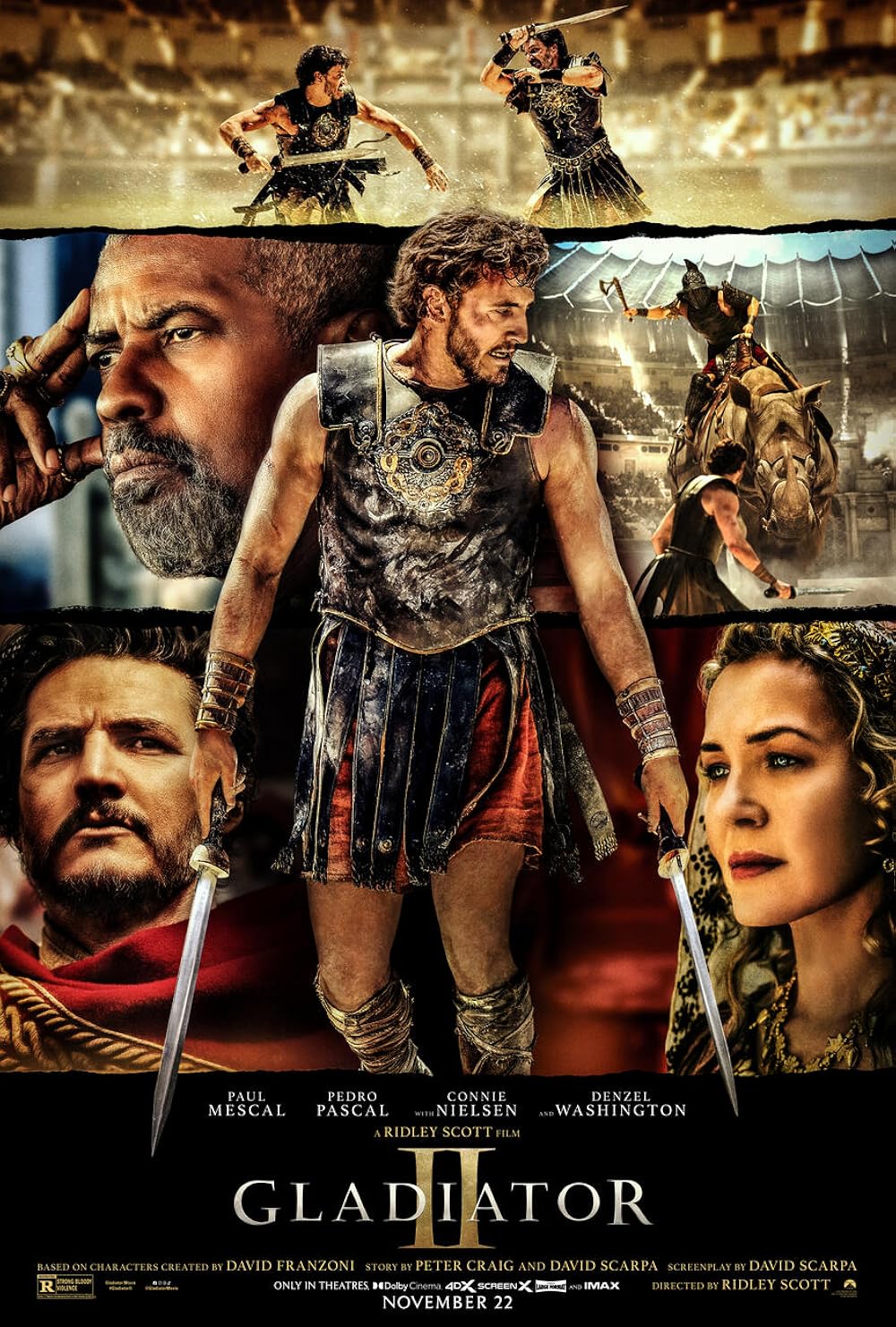Can a film be too much and not enough at the same time? This is the conundrum of Ridley Scott’s “Gladiator II,” a movie bursting with just enough spectacle to keep it from being boring but, when you try to get anything out of it thematically, slips through your fingers like the sand in a warrior’s hands. It’s a film that doesn’t so much struggle to escape the shadow of its predecessor as set up camp in it, willing to hit so many of the same beats and concepts that the rhythm becomes numbingly familiar. Bursting through that familiarity is a spectacular performance from Denzel Washington, giving such a consistently engaging turn that he almost throws off the film’s balance; you kind of wish the movie was about him instead of its leading man. But that would require a break from the formulaic structure of a hero’s journey from slave to leader this film is so content to fulfill.
“Gladiator II” opens 16 years after the death of Russell Crowe’s Maximus with an impressively staged battle sequence that establishes a time of great violence and a pair of central characters: the Roman General Marcus Acacius (Pedro Pascal) and a refugee from Rome named Lucius Verus aka “Hanno” (Paul Mescal). Acacius leads his soldiers on an assault that results in the death of Lucius’s wife, setting him up as the enemy that Lucius will have to topple in the Colosseum, but David Scarpa’s script isn’t that straightforward. It’s revealed quickly that Acacius is married to Lucilla (Connie Nielsen), the partner of Maximus from the first film, and things get really complicated when it’s revealed that Lucius is the son that Lucilla sent off to safety years earlier. That’s right. It’s Maximus 2.0.
Before then, Lucius ends up forced to fight for his life against a group of feral baboons, impressing a gladiator handler named Macrinus (Washington). He’s taken in by the rage he sees within Lucius, currently aimed at General Acacius. Cut to Rome, where we’re introduced to a pair of eccentric emperors named Geta (Joseph Quinn) and Caracalla (Fred Hechinger). Quinn and Hechinger go all-in on wide-eyed, manic, power-hungry caricatures, which is one of the film’s bigger problems: it feels like actors in this film are all in different movies. Washington plays Macrinus as the most politically savvy person in any room he’s in, but he’s doing Shakespeare while Quinn/Hechinger are doing, well, “Beavis and Butthead.” Of course, we’re supposed to see Macrinus as smarter and saner than the Emperors, but there’s a version of “Gladiator II” that doesn’t reduce the men most responsible for the bloodshed to such thin characters.
More damaging is how often “Gladiator II” seems distracted by its own spectacle. Much as battles in the Colosseum were designed to keep subjugated people from revolting by presenting them with bloodshed as escapism, “Gladiator II” feels obligated to up the ante with its fight scenes, leading to a number of insane set pieces, including the aforementioned cartoon baboons (the CGI here is not great, which is too bad given how good most of the film looks), a soldier atop a rhino and sharks in the Colosseum. Yes, sharks. Every time that “Gladiator II” feigns interest in something thematically rich regarding power—how it’s obtained and, more so, how it’s toppled—the movie spins off in the other direction, almost as if everyone involved is afraid to bite their teeth into anything meaty. And then the film dives so hard into the Lucius/Maximus connection that it starts incorporating footage from the first film. It becomes clear that satisfying fans of that movie is all this one really set out to do.
For a lot of people, and sometimes for this person, that’s enough. It looks great most of the time and the sound mix is fantastic. Scott doesn’t falter in these departments. As for performance, people have come down on Mescal for not being as captivating as Crowe, and he’s not, but I think that’s more because of a script that’s too content to make him a carbon copy instead of his own man. Pascal fares better despite less screen time than the set-up promises. Still, he is the only performer outside of Washington who one can see make choices that other actors might not have considered, especially when his position as a military leader becomes challenged by everything collapsing around him.
Again, it’s Washington’s movie through and through, as the Oscar winner adds another feather to his cap as a man who knows how to position himself to take power in the middle of a revolution but never really considers the cost of those machinations. Imagine a “Gladiator II” from his perspective, and you can see the more ambitious version of this sequel that could have happened. If only the filmmakers were willing to think outside the Colosseum.
One of the most infamous unproduced screenplays of all time was Nick Cave’s “Gladiator II,” a project developed under the title “Christ Killer,” wherein Crowe would return as a Maximus who has to battle his way out of purgatory and is forced to live for generations, battling in some form through the wars of the 20th century all the way to present day. It sounds insane. Of course, it was shut down, but I couldn’t help thinking while watching this “Gladiator II” that there had to be some middle ground between that kind of grandiose, sharp right turn from the original to one that’s so content to stay in the same lane. Yes, I am entertained, but is that all you got?




















